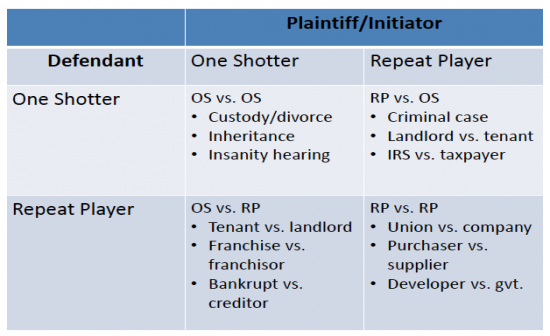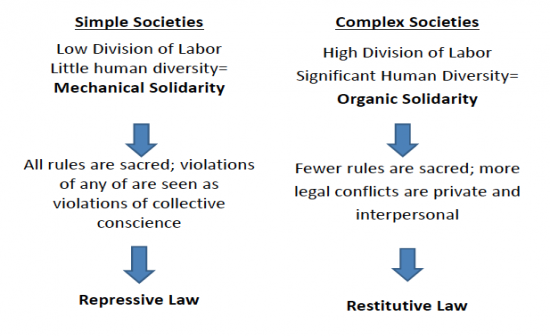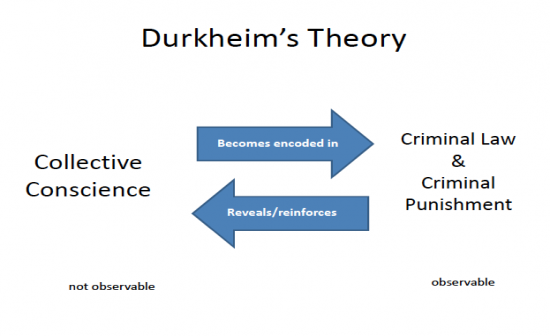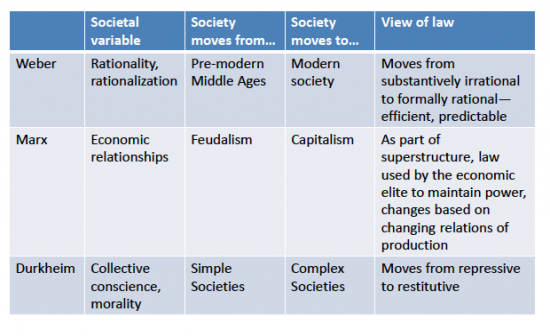Cards In This Set
| Front | Back |
|
Why that 'haves' come out ahead: types of players
|
1. One shotters: Individuals or companies who have only occasional recourse to courts. High stakes in dispute (relative net worth). consequence: tendency to play for the outcome (outcome is meaningful). can transform him/herself into RP by hiring good lawyer
2. Repeat players: Often engaged in similar litigation (go to court regularly, have experience), stakes in any specific case are small, resources to pursue long-term interests. consequence: tendency to play for the rules - play long game for own interests, want precedent to be built that favors them, RP try to settle case that will adversely effect precedent - throw money at these cases |
|
OS and RP table
|
 OS vs OS and RP vs RP = wash. RP vs OS = RP initiator. OS vs. RP, RP still has advantage. RP = bourgeosie |
|
Emile Durkhein background
|
1858-1917. french sociologist, one of the founding fathers of legal studies, focused on what binds people and society together
|
|
Collective Conscience
|
A society's morality is encoded in society's collective conscience. the collective conscience is not observable, but is expressed in law which can be observed and measured. this is where we find society's morality.
|
|
Law's roles in society
|
1. It is the best and most objective indicator of the content of the collective conscience (change in collective conscience leads to change in law). shows what society finds acceptable and unacceptable
2. Through defining and punishing crime it helps society reinforce the collective morality. crime and punishment is important and functional and we should not try and get rid of them |
|
Two Types of Law
|
1. repressive law: goal is punishment - many forms of punishment, is assault on collective conscience
2. restitutive law: goal is restoration or creation of relationships (not always punishment) Durkheim argues that as society gets more complex, law becomes less repressive and more restitutive. this is a reflection of an underlying change in the collective conscience. as society gets more complex, repressive leads to restitutive law. this is evidence the collective conscience is changing |
|
Simple and complex societies flow chart
|
 |
|
Critiques of Durkheim
|
1. he was wrong. research has shown that: simple societies have a lot of restitutive law, complex societies can be quite punitive and repressive. simple societies have a lot of kinship/family ties
2. the law may not be an indication of moral consensus, but instead the result of contestation over moral values (Hartog) |
|
Emile Durkheim's Theory of crime and punishment
|
1. Crime is normal; societies cannot function without it - goal is not to eradicate crime, especially true as societies become more complex. crime and punishment helps us as society to reaffirm what we believe is wrong/our collective conscience.
2. Crime elicits a punitive response, and punishment is a mechanism for showing the collective conscience still exists and maintaining social solidarity. without collective conscience society will fall apart. crime clarifies social norms, increases conformity, strengthens social bonds 3. Punishment is expressive and ritualistic. it has to be observed by members of a society in order to fulfill its function. punishment plays important role but has to be observes to work. without crime there is no punishment which gets rid of collective conscience which leads to collapse society. is not deliberate, but is natural thing that brings people together |
|
Durkheim's Theory Flow Chart
|
 Crime and punishment may crack collective conscience for a minute but will eventually even out |
|
Weber, Marx, Durkheim chart
|
 |
|
Salem Witch Trials
|
In a time of societal instability, society cannot cope so looks for deviance - people behaving outside collectie conscience - and punish them. it happens naturally. we see crime waves - increased reporting of crime, does not necessarily mean increased criminal behavior, but because people are looking for it. they want things more punitive to reaffirm collective conscience. there is push for law enforcement to implement. Puritans founded MA Bay Colony because worried about purity of Anglican Church in England. their collective conscience was rooted in teh idea that god has predetermined everyday life, who will go to heaven and hell. rich were in god's favor, poor were not. late 17th century king decided should no longer be colony and withdrew charter. disagreement amongst colonists. has conquered external enemies - nature, natives. a lot of personal feuds, purpose fading. Durkheim says collective conscience is wavering, led to witch hunt to make collective conscience known. brought community back together, led to crime wave. other examples of crime waves: nazi germany, U.S. communism concern, war on drugs
|
|
Imprisonment in the U.S.
|
Spike in 1980 - war on drugs. response to depresssion.
|
|
Pre-modern vs. Modern Executions
|
1. Premodern Executions: Dramatic, ritualistic, sacred, public, showcased th ebody of the condemned, moral.
2. Modern Executions: rationalized, private, minimized the significance of the body of the condemned, amoral |
|
Rationalized Executions
|
1. Goals: end life as quickly as possible, minimize resistance, little to no display of emotion, no unpredictability. emotion ruins efficiency, calls into question state's authority to execute. "goal" is an ideal
2. To do this, changes have been made in: Method of execution (lethal injection today, used to be had choice); location of execution (inside, less potential for unpredictable responses, outbursts); length of time required for execution (quick); procedures followed during the execution (division of labor so one person not responsible, decreased level of moral reflection) |



